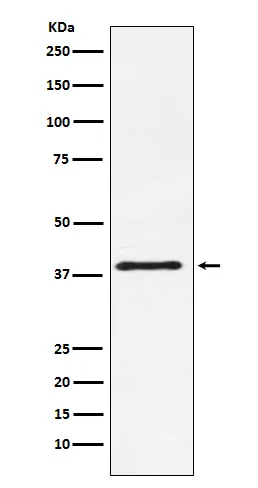
Size:100μL Price:$230
Size:200μL Price:$380
Application:WB,IHC,FC,IP,IF-P
Reactivity:Human,Mouse
Conjugate:Unconjugated
Optional conjugates: Biotin, FITC (free of charge). See other 26 conjugates.
Gene Name:CTLA4
Summary
| Production Name | CTLA4 (CD152) (14H2) Rabbit Monoclonal Antibody |
| Description | Recombinant rabbit monoclonal antibody |
| Host | Rabbit |
| Application | WB,IHC,FC,IP,IF-P |
| Reactivity | Human,Mouse |
Performance
| Conjugation | Unconjugated |
| Modification | Unmodified |
| Isotype | IgG |
| Clonality | Monoclonal |
| Form | Liquid |
| Storage | Store at 4°C short term. Aliquot and store at -20°C long term. Avoid freeze/thaw cycles. |
| Buffer | Rabbit IgG in phosphate buffered saline , pH 7.4, 150mM NaCl, 0.02% New type preservative N and 50% glycerol. Store at +4°C short term. Store at -20°C long term. Avoid freeze / thaw cycle. |
| Purification | Affinity purification |
Immunogen
| Gene Name | CTLA4 |
| Alternative Names | CTLA4;CD;CD152;CELIAC3;CTLA-4;GRD4;GSE;ICOS;IDDM12; |
| Gene ID | 1493 |
| SwissProt ID | P16410 |
Application
| Dilution Ratio | WB 1:500-1:2000,IHC 1:200-1:500,FC 1:200-1:500,IP 1:20-1:50,IF-P 1:200-1:500 |
| Molecular Weight | 25kDa |
Background
Inhibitory receptor acting as a major negative regulator of T-cell responses. The affinity of CTLA4 for its natural B7 family ligands, CD80 and CD86, is considerably stronger than the affinity of their cognate stimulatory coreceptor CD28. Inhibitory receptor acting as a major negative regulator of T-cell responses. The affinity of CTLA4 for its natural B7 family ligands, CD80 and CD86, is considerably stronger than the affinity of their cognate stimulatory coreceptor CD28.
Research Area
Cell adhesion molecules (CAMs);T_Cell_Receptor;Autoimmune thyroid disease;
